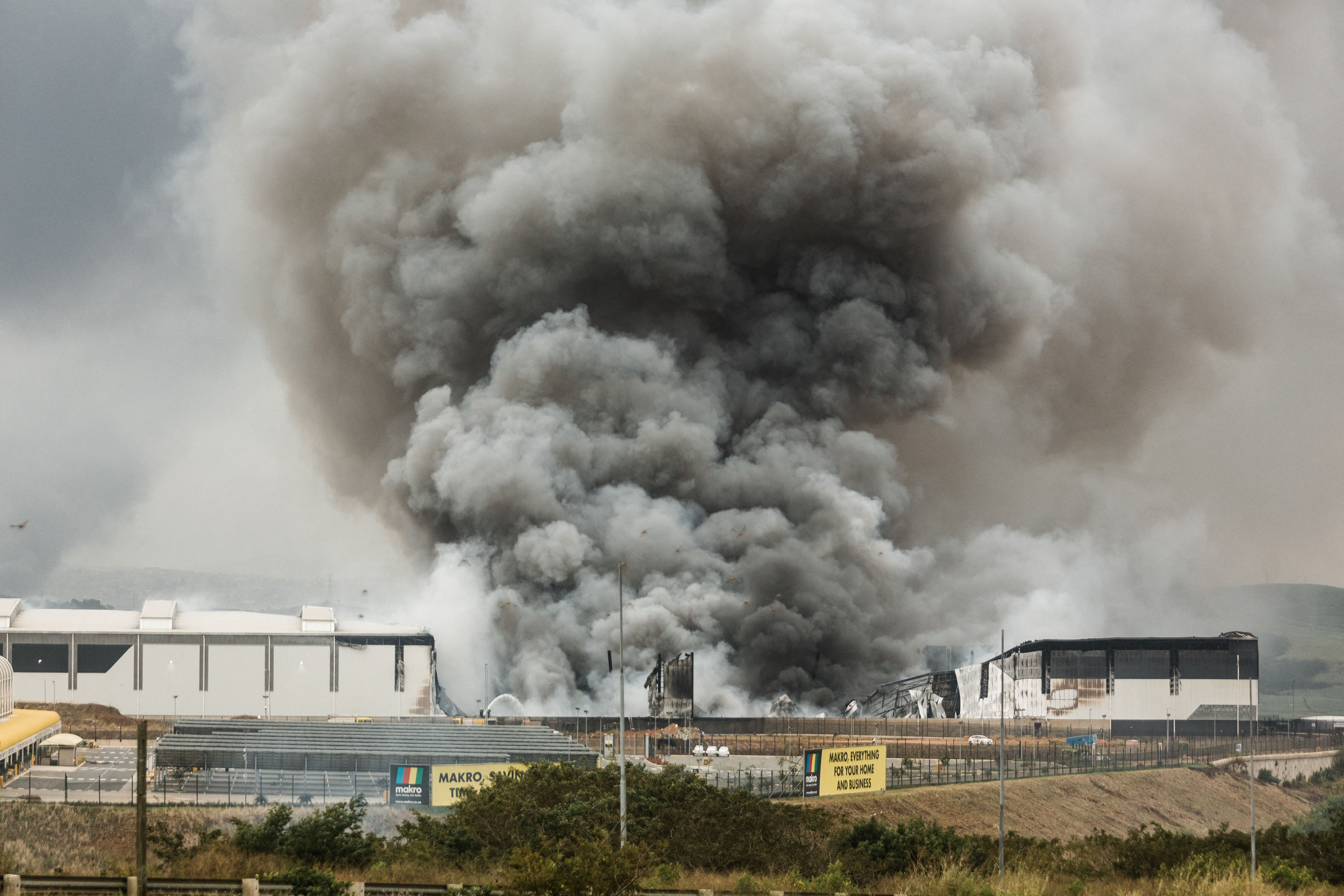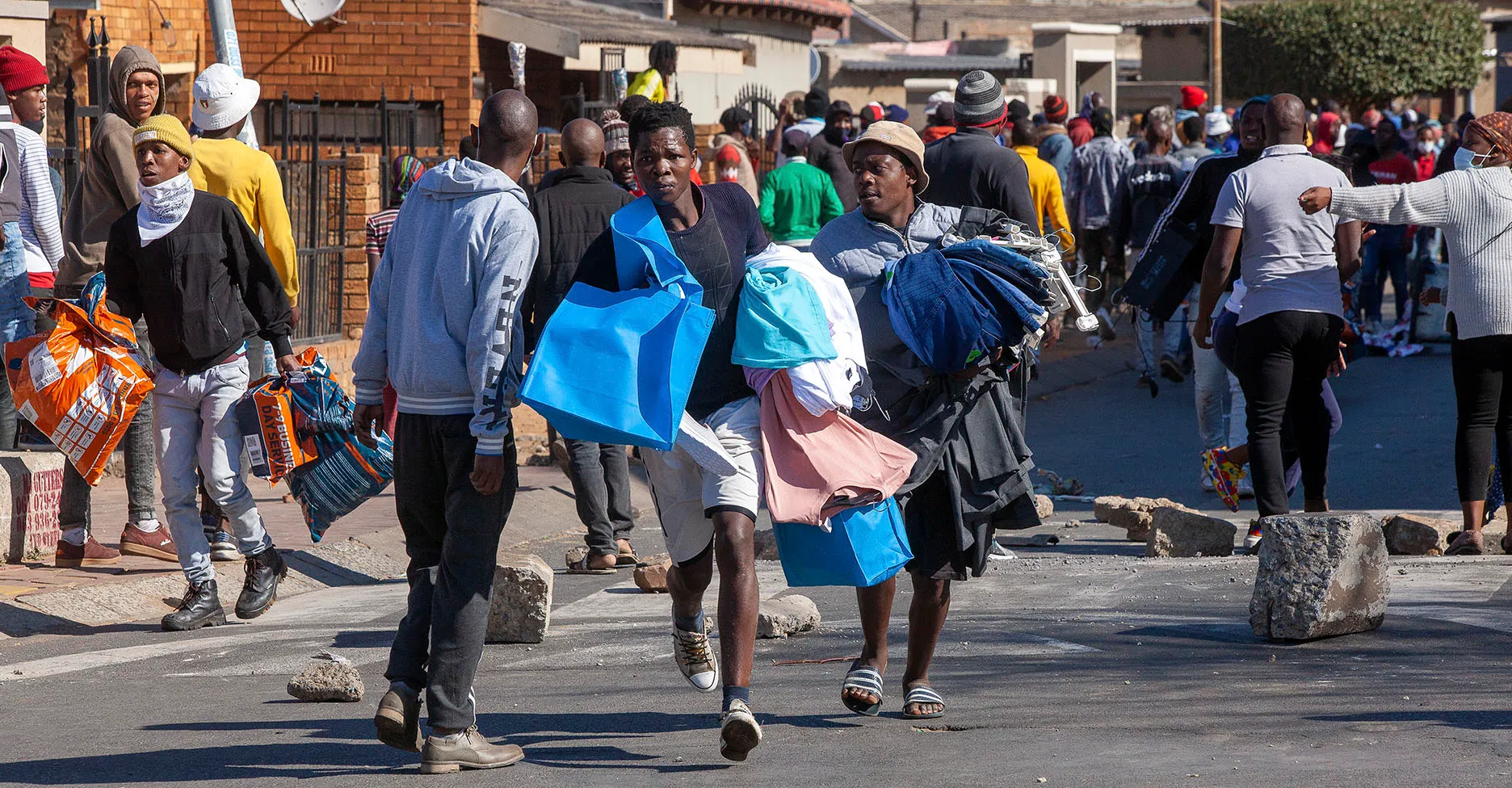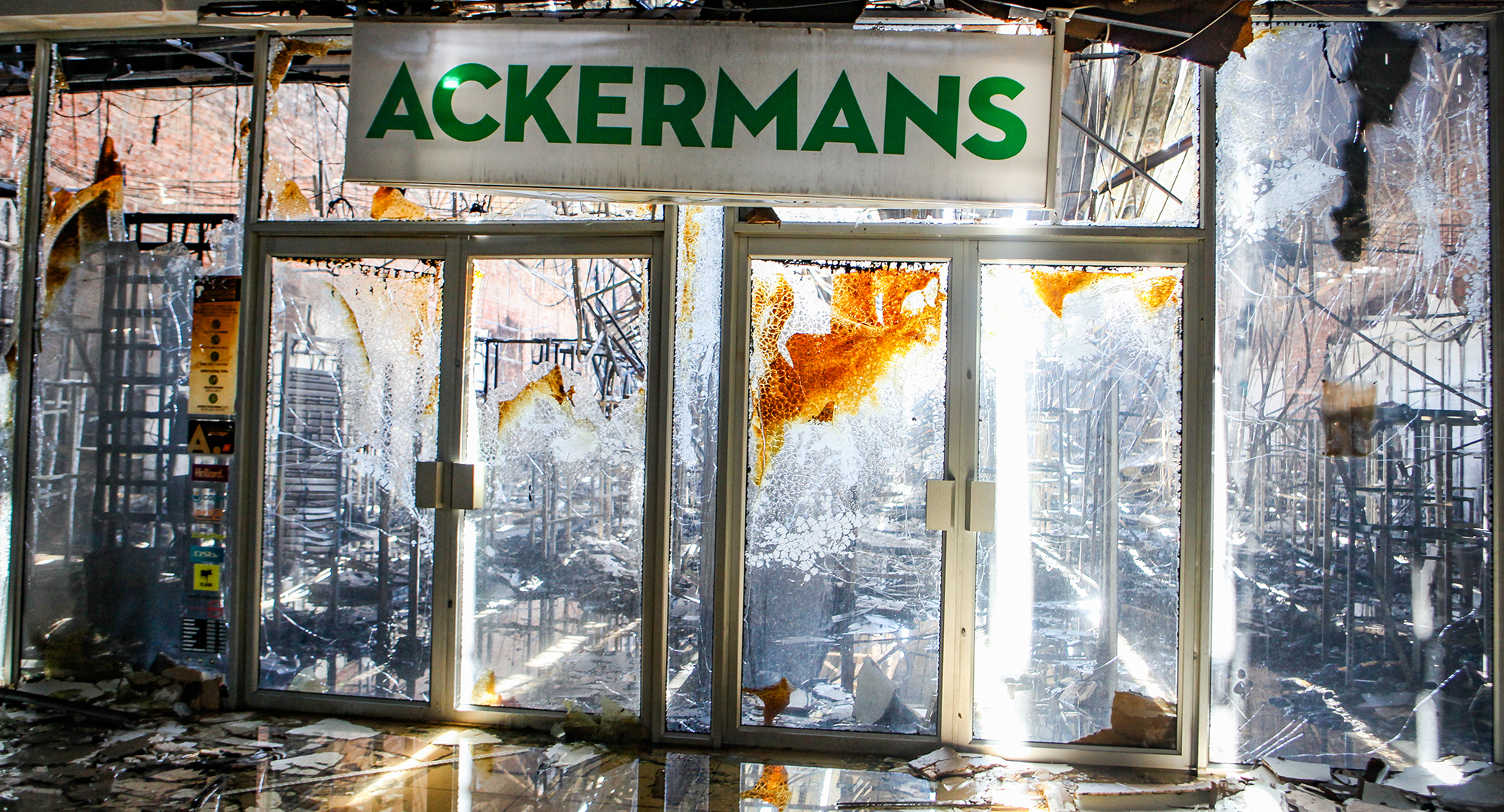It was inherently problematic that a threat to the state, such as witnessed during the July riots, emerged from within the governing party, the South African Human Rights Commission (SAHRC) was told on Thursday.
With such a threat came the inevitable conundrum for the country’s politicised security services, said Institute for Security Studies (ISS) consultant David Bruce.
“If the July unrest were to be preempted, it would have required that the intelligence services focus their scrutiny on elements within or linked to the governing party. So, inevitably that takes them into a situation about whether they are being politically used or if there is some political preference that is being applied by them.
“What this ultimately leads to is the need for us to engage with our governing party about the problematic consequences of the implications of its internal dynamics and politics on the country as a whole, but also for the security services.”
 Smoke rises from a Makro building set on fire overnight in Umhlanga, north of Durban, on 13 July 2021. (Photo: Rajesh Jantilal / AFP)
Smoke rises from a Makro building set on fire overnight in Umhlanga, north of Durban, on 13 July 2021. (Photo: Rajesh Jantilal / AFP)
Bruce was testifying to commissioners Andre Gaum, Chris Nissen and Philile Ntuli, who have temporarily set up office at the aha Gateway Hotel in Umhlanga, with several evidence leaders, to probe the violence and its causes.
Among the witnesses to have testified thus far are ministers, activists, senior police officers, civil society leaders and some of the alleged victims of racial violence that took place in several “Indian areas” of KwaZulu-Natal.
The State Security Agency (SSA), which has come under fire for its lack of intelligence gathering in the lead-up to and during the riots, was supposed to appear before the commission early on Thursday, but this did not take place, as the agency wants its testimony to be in camera for reasons of “national security”. A date is yet to be agreed upon for the appearance of the SSA.
The ISS submitted a report to the commission focusing mostly on the police response to the unrest. Bruce did not read the report on Thursday, but rather spoke on aspects contained therein.
He told evidence leader advocate Rantsho Moraka that he mostly agreed with National Police Commissioner Khehla Sitole’s testimony earlier in the week that the violence was “an entirely unique event” in some ways, given the targeted destruction that took place on a large scale and the widespread looting that followed.
In his testimony this week, KwaZulu-Natal Provincial Commissioner Nhlanhla Mkhwanazi agreed with Sitole that given the scale of the unrest, it would have been impossible for the province’s 18,000 police officers to attend to each incident.
Sporadic outbursts of violence started on the night of 8 July, after the early-morning jailing of former president Jacob Zuma on contempt of court charges. Prior to this, hundreds of Zuma supporters had gathered at his Nkandla homestead for days, vowing to stop his arrest and openly threatening that “blood” would “flow” if attempts were made to jail him.
Social media was also awash with threats about how the country would “burn” if Zuma were arrested.
“There’s no question that social media was used to encourage people to behave in an unlawful way and in an insurrectionary manner,” said Bruce.
The commission has heard from Sitole and Mkhwanazi that the police had an operational plan for Zuma’s arrest and for crowd control at the homestead, but the destruction, looting and loss of life had not been foreseen, and intelligence on the ensuing riots had been largely absent, barring what was seen in the traditional media and on social media.
The commission heard from the Hawks on Wednesday that the specialised crime unit had opened 12 criminal dockets relating to the so-called instigators of the unrest, who did their alleged instigating via social media. Of those, seven people had appeared in court. One more person was arrested and appeared in court on Thursday. Another 12 dockets relating to potential instigators are under investigation.
Referring to Sitole and Mkhwanazi, Bruce said: “In some ways, what is failing us here is not just these individuals in senior positions, but for instance we have a system of political authority over the police, and so on, and if we are looking at the shortcomings of police governance, we have to look there.”
In many ways the governance system started with the president, he said.
“The president appoints the national commissioner of the SAPS and the minister of police, so there are pivotal decisions made at that level. This is critical.
 Looting in Ndofaya on 12 July 2021 in Soweto. (Photo: Gallo Images / Papi Morake)
Looting in Ndofaya on 12 July 2021 in Soweto. (Photo: Gallo Images / Papi Morake)
“What people increasingly recognise as something that would be desirable here is a process that was followed when the National Director of Public Prosecutions was appointed, where there was an open process of selection based on the merits of the person’s suitability for the job. There can be no doubt that a process of that kind needs to be integrated into appointments for senior leadership of the police.”
The police have been openly and frequently criticised for not being visible during the riots and not being able to, or in many cases not trying to, control the thousands of looters — many of them armed and drunk — who invaded malls, warehouses, bottle stores, pharmacies and schools, and who in some instances camped outside shopping centres for days waiting for transport to ferry their stolen goods.
Bruce said the response of the police to the unrest “was to some degree ineffective”, and there was “some idea that it was not vigorous enough, that they didn’t take the unrest seriously. I am just caricaturing here some of the ideas that I have seen in the media.”
Ambiguous in that assertion, he said, was if the people making such statements were implying that the police should have used more force.
“The position taken in the ISS submission is that we have to affirm that the police did not respond to lethal force. It isn’t something that should be used to protect property.”
But he added that one wouldn’t want to create a situation where there was “a right to loot” because police could not use appropriate force.
Such was the scale of the looting and unrest, and the absence of the “overwhelmed” police, that terrified communities all over the province set up impromptu patrol groups to keep their families and their properties safe while waiting for the defence force to be deployed.
Hundreds of looters, many drunk and in upmarket vehicles with the number plates removed, used neighbourhood streets as thoroughfares to transport goods stolen from malls, and randomly shot into the air as they drove by.
In countless suburbs and townships, gunshots started in the morning and rang through the night, with the smell of gunpowder and the stench from explosions settling in homes.
According to Mkhwanazi, 281 people died in KwaZulu-Natal because of the unrest. The vast majority of these were looters crushed to death in stampedes over stolen items, or who fought each other over these.
Although Mkhwanazi testified that the police had ample “non-lethal weapons” to contain crowds, but lacked manpower, scores of community patrol and policing forum groups were contacted by local police stations and told they had run out of rubber bullets, and that communities were on their own.
Bruce told the commission that the ISS submission addressed the use of rubber bullets as part of effective crowd control in most protest situations.
“If one is talking not specifically about the unrest, but more generally about the protest environment in South Africa — and this is based on international research, but is consistent with the situation domestically — generally, in protest incidents where you do have violence, it is not members of the crowd as a whole who are involved in violence, it is specific members of the crowd, so insofar as force is used by the police, from a human rights perspective, it should be directed/targeted at those individuals.
“The idea that force can be used generally to disperse members of a crowd should not be accepted in South Africa in a general protest environment.
“It is counterproductive for police to use rubber bullets this way. It isn’t necessarily that the members of the group agree with the violence [that is being perpetrated by some]. When the police use violence against the crowd, they will then contribute to a situation where they escalate antagonism against [themselves] and effectively mobilise the crowd against the police.”
Rubber bullets were potential lethal weapons, said Bruce. “One of the major risks... is the risk of eye injury, notwithstanding the fact that they are used widely by SAPS and the security industry. SAPS has no clear written standard… on how these bullets are to be used.”
 The aftermath of unrest and looting at Chris Hani Mall, Vosloorus, Gauteng on 13 July 2021. (Photo: Gallo Images / Sharon Seretlo)
The aftermath of unrest and looting at Chris Hani Mall, Vosloorus, Gauteng on 13 July 2021. (Photo: Gallo Images / Sharon Seretlo)
When it came to the July riots, said Bruce, police could have sought “innovations” or “alternative approaches” to control crowds.
“The knee-jerk response would be to say we need more Public Order Police in South Africa, but the central point we [the ISS] argue is that it is not desirable, the focus should be on alternatives.”
During the unrest, there was a “battle for perception”, he said. “What was being broadcast was that you could go to any mall and take what you wanted… The police might have said we are going to concentrate some of our platoons in some areas, like this mall, and call the media, and get them to show the ‘take-back’ of the mall.”
The protest environment in South Africa was not static, said Bruce, “it requires for agility and flexibility from police in how they respond”.
Police Minister Bheki Cele is expected to testify at the commission on Friday. DM
[hearken id="daily-maverick/8881"]




 The aftermath of unrest and looting at Chris Hani Mall, Vosloorus, Gauteng on 13 July 2021. (Photo: Gallo Images / Sharon Seretlo)
The aftermath of unrest and looting at Chris Hani Mall, Vosloorus, Gauteng on 13 July 2021. (Photo: Gallo Images / Sharon Seretlo)